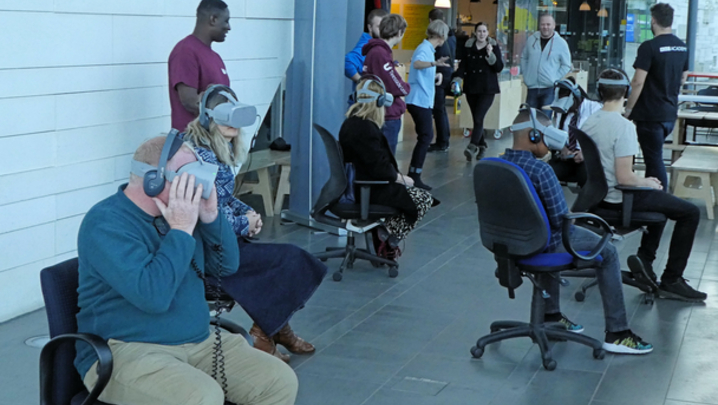How do you stop talented creatives quitting the regions and moving to London? That was the challenge discussed by Tim Weiss, director of vocational skills at ScreenSkills, during a session organised by the Royal Television Society in Sunderland.
“We need to match talent from around the UK with skills shortages,” he told an audience at the National Glass Centre, part of the University of Sunderland, in early July. “And we want to help build sustainable infrastructure in different parts of the country linking universities, colleges and employers.”
During a lively Q&A, audience members gave examples of creative talent quitting the North East because “work is increasingly concentrated in London, the North West and Scotland”. And they spoke of the “Catch 22” situation which meant that without sustainable production companies based in the area, only a handful of individuals working in the region are eligible for the support of ScreenSkills programmes.
Event host Graeme Thompson, pro vice chancellor at the University of Sunderland, pointed out that ITV and the BBC had brought long-running dramas to the region in the form of Vera and The Dumping Ground. And he speculated that the move of Channel 4 to Leeds would have an impact on production capacity in the neighbouring North East.
Weiss described other ways in which ScreenSkills might support the talent pipeline outside the capital. This included the introduction of forecasting analysis – creating a skills barometer to identify the kind of jobs and careers likely to be available in five or ten years from now.
There is also a trainee finder service and a progression initiative for individuals wanting to acquire news skills to move forward in their careers. He said diversity of talent was a significant issue – not just in creating opportunities around gender, race and disability but also in different geographic and soci-economic areas of the country.
He encouraged North East production businesses to take part in November’s Creative Careers Week, which ScreenSkills is organising alongside the Creative Industries Federation and the Creative and Cultural Skills agency. It is an opportunity for artists, producers, curators, actors, designers and crew to talk to young people about routes into television and the creative industries.
The event in Sunderland came on the same day as ScreenSkills chief executive Seetha Kumar was launching a pilot project to unlock the apprenticeship levy for the UK’s booming screen industries.
Visiting the set of the new James Bond film, Jeremy Wright, the Secretary of State for Digital, Culture, Media and Sport, joined Kumar to announce the project at Pinewood Studios in Buckinghamshire.
It comes amid screen industry concerns that millions paid by film, television, visual effects (VFX) and animation companies into the Government scheme – mandatory for all with a wages bill in excess of £3 million - is currently unusable for many roles.
The pilot will work on the model of an apprentice training agency (ATA) where apprentices are employed by the agency and placed on multiple placements over the course of the 12-month programme.
This resolves the problem that many production companies cannot offer a 12-month apprenticeship contract – the legal minimum under apprenticeship levy rules – because of the project-based nature of film and television production, where even large-scale productions employ few roles continuously for a year. This was one of the issues identified during the Sunderland event.
“In Conversation with Tim Weiss” was produced for the RTS North East and the Border Centre by Graeme Thompson






